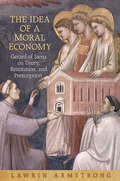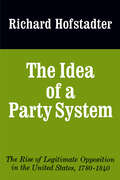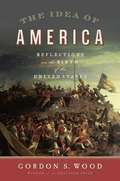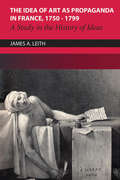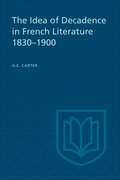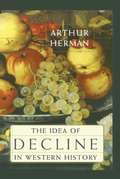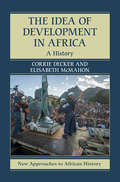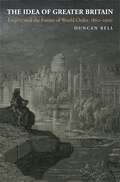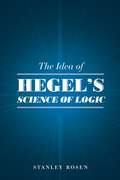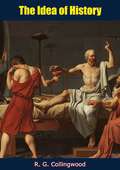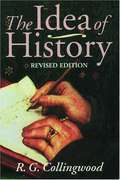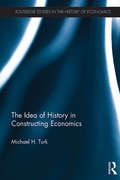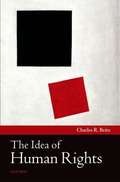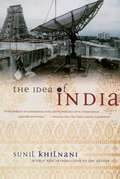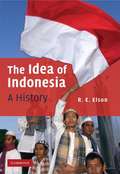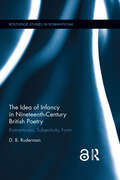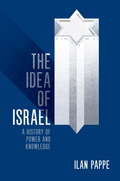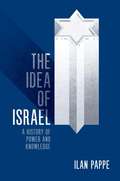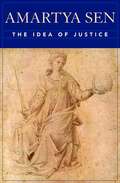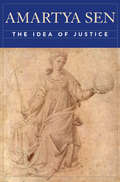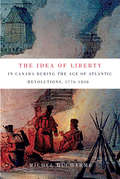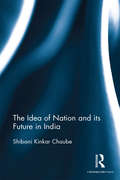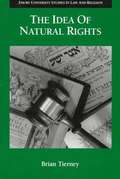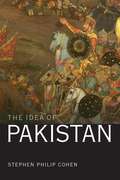- Table View
- List View
The Idea of a Moral Economy: Gerard of Siena on Usury, Restitution, and Prescription
by Lawrin ArmstrongThe Idea of a Moral Economy is the first modern edition and English translation of three questions disputed at the University of Paris in 1330 by the theologian Gerard of Siena. The questions represent the most influential late medieval formulation of the natural law argument against usury and the illicit acquisition of property. Together they offer a particularly clear example of scholastic ideas about the nature and purpose of economic activity and the medieval concept of a moral economy.In his introduction, editor Lawrin Armstrong discusses Gerard's arguments and considers their significance both within the context of scholastic philosophy and law and as a critique of contemporary mainstream economics. His analysis demonstrates how Gerard's work is not only a valuable source for understanding economic thought in pre-modern Europe, but also a fertile resource for scholars of law, economics, and philosophy in medieval Europe and beyond.
The Idea of a Party System: The Rise of Legitimate Opposition in the United States, 1780-1840 (Jefferson Memorial Lecture Series #2)
by Richard HofstadterThis work traces the historical processes in thought by which American political leaders slowly edged away from their complete philosophical rejection of a party and hesitantly began to embrace a party system. In the author's words, "The emergence of legitimate party opposition and of a theory of politics that accepted it was something new in the history of the world; it required a bold new act of understanding on the part of its contemporaries and it still requires study on our part." Professor Hofstadter's analysis of the idea of party and the development of legitimate opposition offers fresh insights into the political crisis of 1797-1801, on the thought of George Washington, Thomas Jefferson, James Madison, James Monroe, Martin Van Buren, and other leading figures, and on the beginnings of modern democratic politics.
The Idea of America: Reflections on the Birth of the United States
by Wood Gordon S.The preeminent historian of the Founding Era reflects on the birth of American nationhood and explains why the American Revolution remains so essential. For Pulitzer Prize-winning historian Gordon S. Wood, the American Revolution is the most important event in our history, bar none. Since American identity is so fluid, we have had to continually return to our nation’s founding to understand who we are. In a series of illuminating essays, he explores the ideological origins of the Revolution—from Ancient Rome to the European Enlightenment—and the founders’ attempts to forge a democracy. He reflects on the origins of American exceptionalism, the radicalism and failed hopes of the founding generation, and the “terrifying gap” between us and the men who created the democratic state we take for granted. This is a profoundly revealing look at the event that forged the United States and its enduring power to define us. .
The Idea of Art as Propaganda in France, 1750-1799: A Study in the History of Ideas (The Royal Society of Canada Special Publications #No. 8)
by James LeithOne of the most modern features of the French Revolution was its intention of shaping a new kind of citizen by exposing him from childhood to inspirational messages and behavioral models. In this effort to regenerate the masses the French Revolutionaries sought to employ not only schools, but newspapers, festivals, dramas, poems, songs, paintings, statues, and engravings as well. At the peak of the Terror, French leaders brough tthe West to the threshold of the totalitarian state in the fullest sense of the world: they established a single party state, directed a regimented economy, created a mass army, and sought to mobilize all the media capable of influencing the human mind. In was an interest in both art and the Revolution which led Professor Leith to explore the groth of the idea of using art as one instrument of propaganda. The idea proved to have deep roots in western civilization, going back to classical thinkers, medieval churchmen, and the art officials of such monarchs as Louis XIV. But following the hedonistic rococo art of the first half of the eighteenth century, this idea of didactic art took on a new lease of life, reaching a crescendo during the Terror. This book analyses the contribution of the philosophes, the Encyclopedists, royal officials, art critics, and revolutionary leaders to the resurgence of the idea; it also probes the peculiar psychological assumptions which led eighteeneth-century thinkers to believe in the efficacy of visual propaganda. The outcome of this idea of art as an ideological weapon was involved in the fate of the Revolution itself, yet it was also affected by certain curious tensions already evident in the minds of its advocates under the Old Régime. Lingering interest in purely aesthetic values,k affirmation of the need for creative freedom, and determination to maintain French cultural hegemony, all complicated the effort to turn art into a vehicle of civic instruction. The final chapter examines the rôle of these tensions in the dénouement of the idea in the closing phase of the Revolution.This book should appeal not only to those interested in French civilization, the age of Enlightment, and they French Revolution, but to those concerned with the rôle of art and the artist in modern society as well.
The Idea of Decadence in French Literature, 1830-1900 (University of Toronto Romance Series #3)
by A. E. CarterThe cult of decadence is usually dismissed as an eccentricity of French literature, a final twitter of Romantic neurosis, convulsing the lunatic fringe of letters during the last third of the nineteenth century. However, the nineteenth century's preoccupation with decadence provides us with a key to the secret places of its thought, to all the obscure passages and backstairs behind the triumphant façade. Between 1814 and 1914, there was no sense of disaster, no tragic sense. Civilization had become a habit, a side product of political constitutions and applied science. History was viewed pragmatically: of what use were such traditional symbols as throne and altar? Both are essentially propitiatory, evidence of man's uneasy knowledge that power is dangerous and destiny implacable. And both seemed anachronisms in a world where (it was thought) human reason had solved or would solve all the old problems. The theory of decadence is very largely a protest against this comfortable belief. Had the decadents not written, we should hardly suspect that the nineteenth century suffered from the same doubts and hesitations as all other ages, before and since.
The Idea of Decline in Western History
by Arthur HermanHistorian Arthur Herman traces the roots of declinism and shows how major thinkers, past and present, have contributed to its development as a coherent ideology of cultural pessimism.From Nazism to the Sixties counterculture, from Britain's Fabian socialists to America's multiculturalists, and from Dracula and Freud to Robert Bly and Madonna, this work examines the idea of decline in Western history and sets out to explain how the conviction of civilization's inevitable end has become a fixed part of the modern Western imagination. Through a series of biographical portraits spanning the 19th and 20th centuries, the author traces the roots of declinism and aims to show how major thinkers of the past and present, including Nietzsche, DuBois, Sartre, and Foucault, have contributed to its development as a coherent ideology of cultural pessimism.
The Idea of Development in Africa: A History (New Approaches to African History)
by Corrie Decker Elisabeth McMahonThe Idea of Development in Africa challenges prevailing international development discourses about the continent, by tracing the history of ideas, practices, and 'problems' of development used in Africa. In doing so, it offers an innovative approach to examining the history and culture of development through the lens of the development episteme, which has been foundational to the 'idea of Africa' in western discourses since the early 1800s. The study weaves together an historical narrative of how the idea of development emerged with an account of the policies and practices of development in colonial and postcolonial Africa. The book highlights four enduring themes in African development, including their present-day ramifications: domesticity, education, health, and industrialization. Offering a balance between historical overview and analysis of past and present case studies, Elisabeth McMahon and Corrie Decker demonstrate that Africans have always co-opted, challenged, and reformed the idea of development, even as the western-centric development episteme presumes a one-way flow of ideas and funding from the West to Africa.
The Idea of Greater Britain: Empire and the Future of World Order, 1860-1900
by Duncan BellDuring the tumultuous closing decades of the nineteenth century, as the prospect of democracy loomed and as intensified global economic and strategic competition reshaped the political imagination, British thinkers grappled with the question of how best to organize the empire. Many found an answer to the anxieties of the age in the idea of Greater Britain, a union of the United Kingdom and its settler colonies in Australia, Canada, New Zealand, and southern Africa. In The Idea of Greater Britain, Duncan Bell analyzes this fertile yet neglected debate, examining how a wide range of thinkers conceived of this vast "Anglo-Saxon" political community. Their proposals ranged from the fantastically ambitious--creating a globe-spanning nation-state--to the practical and mundane--reinforcing existing ties between the colonies and Britain. But all of these ideas were motivated by the disquiet generated by democracy, by challenges to British global supremacy, and by new possibilities for global cooperation and communication that anticipated today's globalization debates. Exploring attitudes toward the state, race, space, nationality, and empire, as well as highlighting the vital theoretical functions played by visions of Greece, Rome, and the United States, Bell illuminates important aspects of late-Victorian political thought and intellectual life.
The Idea of Hegel's Science of Logic
by Stanley RosenAlthough Hegel considereda"Science of Logic"aessential to his philosophy, it has received scant commentary compared with the other three books he published in his lifetime. Here philosopher Stanley Rosen rescues thea"Science of Logic"afrom obscurity, arguing that its neglect is responsible for contemporary philosophyOCOs fracture into many different and opposed schools of thought. Through deep and careful analysis, Rosen sheds new light on the precise problems that animate HegelOCOs overlooked book and their tremendous significance to philosophical conceptions of logic and reason. RosenOCOs overarching question is how, if at all, rationalism can overcome the split between monism and dualism. MonismOCowhich claims a singular essence for all thingsOCoultimately leads to nihilism, while dualism, which claims multiple, irreducible essences, leads to what Rosen calls OC the endless chatter of the history of philosophy. OCO Thea"Science of Logic," he argues, is the fundamental text to offer a new conception of rationalism that might overcome this philosophical split. Leading readers through HegelOCOs book from beginning to end, RosenOCOs argument culminates in a masterful chapter on the Idea in Hegel. By fully appreciating the"Science of Logic"aand situating it properly within HegelOCOs oeuvre, Rosen in turn provides new tools for wrangling with the conceptual puzzles that have brought so many other philosophers to disaster. "
The Idea of History
by R. G. CollingwoodFor many years before his death in 1943, R. G. Collingwood, who was both a Professor of Philosophy at Oxford and a practicing historian, was engaged in what he intended as a major contribution to the philosophy of history. The Idea of History, first published in 1946, was put together from the author’s uncompleted manuscript and edited with a critical preface by Professor T. M. Knox.A large part of the book describes how the modern idea of history has grown up from the time of Herodotus to the present day. A final section consists of a number of essays on such subjects as the nature of history, historical method, historical evidence, and progress.Of the author and the book, Hans Kohn wrote in The New York Times: ‘The wit of his learning and the many-sidedness of his gifts as a philosopher, scholar and artist are manifest....an example of scholarship and depth presented with ease and grace.’In The Philosophical Review, Arthur E. Murphy reported: ‘I found it a pleasure to read, a firsthand, enlightening, and intellectually stimulating treatment of a philosophically important subject....It has been a long time since I have encountered a contemporary work of which as much could properly be said....There is much to be learned from it.’
The Idea of History
by R. G. Collingwood Jan Van der DussenThe Idea of History is the best-known work of the great Oxford philosopher, historian, and archaeologist R. G. Collingwood. It was originally published posthumously in 1946, having been mainly reconstructed from Collingwood's manuscripts, many of which are now lost. This important work examines how the idea of history has evolved from the time of Herodotus to the twentieth century, and offers Collingwood's own view of what history is. For this revised edition, Collingwood's most important lectures on the philosophy of history are published here for the first time. These texts have been prepared by Jan van der Dussen from manuscripts that have only recently become available. The lectures contain Collingwood's first comprehensive statement of his philosophy of history; they are therefore essential for a full understanding of his thought, and in particular for a correct interpretation of The Idea of History itself. Van der Dussen contributes a substantial introduction in which he explains the background to this new edition and surveys the scholarship of the last fifty years.
The Idea of History in Constructing Economics (Routledge Studies in the History of Economics)
by Michael H. TurkHow scientific is economics? This question has often been framed by analogies and correspondences made between economics and other, seemingly more well-established scientific disciplines, starting with classical mechanics. At the same time economics is likely to be seen in opposition to or in contrast with history, where the reliance upon generalizing rules, thought experiments, and model construction in economics is set against the amassing of particular facts intended to create narratives in history. In this new volume, Turk explores the relationship between economics and history, including the often fraught one between economics and economic history, making the case that economics does in fact require the proper grounding in history that has so often been ignored. This work challenges the attempt to link economics with other, more clearly ‘scientific’ disciplines as flawed and fundamentally wrongheaded. A key element of this book is its examination of the gaps and associations that exist in, or are seen through, linkages with thermodynamics, classical mechanics , biology, literature, mathematics, philosophy, and sociology. This exploration is frequently undertaken through study of the work of one or more major figures in the history of economic thought, ranging from Quesnay and Smith, through Walras and Max Weber, to Robinson, Krugman, David, and Arthur. Through the possibility of an alternative to the gaps noted in each such comparison, the underlying, necessary connection between economics and history can be brought out. The book concludes by exploring the basis for the positive construction of a historical economics. This book is suited for those who study history of economic thought and philosophy of economics.
The Idea of Human Rights
by Charles R. BeitzThe international doctrine of human rights is one of the most ambitious parts of the settlement of World War II. Since then, the language of human rights has become the common language of social criticism in global political life. This book is a theoretical examination of the central idea of that language, the idea of a human right. In contrast to more conventional philosophical studies, Charles Beitz takes a practical approach, looking at the history and political practice of human rights for guidance in understanding the central idea. Betiz presents a model of human rights as matters of international concern whose violation by governments can justify international protective and restorative action ranging from intervention to assistance. He proposes a schema for justifying human rights and applies it to several controversial cases--rights against poverty, rights to democracy, and the human rights of women.
The Idea of India
by Sunil KhilnaniThe key book on India in the post nuclear era, with a new Introduction by the author. Our appreciation of the importance of India can only increase in light of the recent revelations of its nuclear capabilities.
The Idea of Indonesia: A History
by R. E. ElsonIndonesia the nation-state is a miraculous and unlikely construction. At first sight, the material for national unity could not be more unpromising; its history is marred by deep and often bloody internal disputation based on ideology, ethnicity, religion, and region. Yet Indonesia, as concept and as nation-state, endures and is, perhaps, beginning once again to thrive. R. E. Elson, one of the leading figures in the field, seeks to discover the origins of the idea of Indonesia in the mid-nineteenth century and explores its often vexed and troubled trajectory through to the present time. He examines why Indonesia exists, against the odds, as a nation-state, and in what different forms it has existed, seeking to explain the nation's character as it has struggled for unity and purpose. The analysis provides a chronological narrative which examines Indonesian politics, its political elites and their relationship with the Indonesian people.
The Idea of Infancy in Nineteenth-Century British Poetry: Romanticism, Subjectivity, Form (Routledge Studies in Romanticism)
by D.B. RudermanThis book radically refigures the conceptual and formal significance of childhood in nineteenth-century English poetry. By theorizing infancy as a poetics as well as a space of continual beginning, Ruderman shows how it allowed poets access to inchoate, uncanny, and mutable forms of subjectivity and art. While recent historicist studies have documented the "freshness of experience" childhood confers on 19th-century poetry and culture, this book draws on new formalist and psychoanalytic perspectives to rethink familiar concepts such as immortality, the sublime, and the death drive as well as forms and genres such as the pastoral, the ode, and the ballad. Ruderman establishes that infancy emerges as a unique structure of feeling simultaneously with new theories of lyric poetry at the end of the eighteenth century. He then explores the intertwining of poetic experimentation and infancy in Wordsworth, Anna Barbauld, Blake, Coleridge, Erasmus Darwin, Sara Coleridge, Shelley, Matthew Arnold, Tennyson, and Augusta Webster. Each chapter addresses and analyzes a specific moment in a writers’ work, moments of tenderness or mourning, birth or death, physical or mental illness, when infancy is analogized, eulogized, or theorized. Moving between canonical and archival materials, and combining textual and inter-textual reading, metrical and prosodic analysis, and post-Freudian psychoanalytic theory, the book shows how poetic engagements with infancy anticipate psychoanalytic and phenomenological (i.e. modern) ways of being in the world. Ultimately, Ruderman suggests that it is not so much that we return to infancy as that infancy returns (obsessively, compulsively) in us. This book shows how by tracking changing attitudes towards the idea of infancy, one might also map the emotional, political, and aesthetic terrain of nineteenth-century culture. It will be of interest to scholars in the areas of British romanticism and Victorianism, as well as 19th-century American literature and culture, histories of childhood, and representations of the child from art historical, cultural studies, and literary perspectives. "D. B. Ruderman’s The Idea of Infancy in Nineteenth-Century British Poetry: Romanticism, Subjectivity, Form is an interesting contribution to this field, and it manages to bring a new perspective to our understanding of Romantic-era and Victorian representations of infancy and childhood. …a supremely exciting book that will be a key work for generations of readers of nineteenth-century poetry." Isobel Armstrong, Birkbeck, University of London Victorian Studies (59.4)
The Idea of Israel
by Ilan PappeSince its foundation in 1948, Israel has drawn on Zionism, the movement behind its creation, to provide a sense of self and political direction. In this groundbreaking new work, Ilan Pappe looks at the continued role of Zionist ideology. The Idea of Israel considers the way Zionism operates outside of the government and military in areas such as the country's education system, media, and cinema, and the uses that are made of the Holocaust in supporting the state's ideological structure.In particular, Pappe examines the way successive generations of historians have framed the 1948 conflict as a liberation campaign, creating a foundation myth that went unquestioned in Israeli society until the 1990s. Pappe himself was part of the post-Zionist movement that arose then. He was attacked and received death threats as he exposed the truth about how Palestinians have been treated and the gruesome structure that links the production of knowledge to the exercise of power. The Idea of Israel is a powerful and urgent intervention in the war of ideas concerning the past, and the future, of the Palestinian-Israeli conflict.
The Idea of Israel: A History of Power and Knowledge
by Ilan PappeSince its foundation in 1948, Israel has drawn on Zionism, the movement behind its creation, to provide a sense of self and political direction. In this groundbreaking new work, Ilan Pappe looks at the continued role of Zionist ideology. The Idea of Israel considers the way Zionism operates outside of the government and military in areas such as the country's education system, media, and cinema, and the uses that are made of the Holocaust in supporting the state's ideological structure. In particular, Pappe examines the way successive generations of historians have framed the 1948 conflict as a liberation campaign, creating a foundation myth that went unquestioned in Israeli society until the 1990s. Pappe himself was part of the post-Zionist movement that arose then. He was attacked and received death threats as he exposed the truth about how Palestinians have been treated and the gruesome structure that links the production of knowledge to the exercise of power. The Idea of Israel is a powerful and urgent intervention in the war of ideas concerning the past, and the future, of the Palestinian-Israeli conflict.
The Idea of Justice
by Amartya SenSocial justice: an ideal, forever beyond our grasp; or one of many practical possibilities? More than a matter of intellectual discourse, the idea of justice plays a real role in how—and how well—people live. And in this book the distinguished scholar Amartya Sen offers a powerful critique of the theory of social justice that, in its grip on social and political thinking, has long left practical realities far behind. The transcendental theory of justice, the subject of Sen’s analysis, flourished in the Enlightenment and has proponents among some of the most distinguished philosophers of our day; it is concerned with identifying perfectly just social arrangements, defining the nature of the perfectly just society. The approach Sen favors, on the other hand, focuses on the comparative judgments of what is “more” or “less” just, and on the comparative merits of the different societies that actually emerge from certain institutions and social interactions. At the heart of Sen’s argument is a respect for reasoned differences in our understanding of what a “just society” really is. People of different persuasions—for example, utilitarians, economic egalitarians, labor right theorists, no-nonsense libertarians—might each reasonably see a clear and straightforward resolution to questions of justice; and yet, these clear and straightforward resolutions would be completely different. In light of this, Sen argues for a comparative perspective on justice that can guide us in the choice between alternatives that we inevitably face.
The Idea of Justice
by Amartya SenCreated by the continuous feedback of a "student-tested, faculty-approved" process, RELG: WORLD, Second Edition, delivers a visually appealing and succinct print component, tear-out review cards, and a consistent online offering with CourseMate that includes an eBook and a set of interactive digital tools--all at a value-based price. This book frames different religions as encounters between the religions' adherents and individuals who are much like readers, making the subject come alive. The eBook includes numerous annotated links to videos, audio, Google Earth(tm) explorations, and primary sources.
The Idea of Liberty in Canada during the Age of Atlantic Revolutions, 1776-1838
by Michel DucharmeIn Idea of Liberty in Canada during the Age of Atlantic Revolutions, 1776-1838, Michel Ducharme shows that Canadian intellectual and political history between the American Revolution and the Upper and Lower Canada rebellions of 1837-38 can be better understood by considering it in relation to the broad framework of revolution in the Atlantic world between 1776 and 1838. Inspired by intellectual histories of the Atlantic world, Ducharme goes beyond the scholarly focus on Atlantic republicanism to present the rebellions of 1837-38 as a confrontation between two very different concepts of liberty. He uses these concepts as lenses through which to read colonial ideological conflict. Ducharme traces political discourse in both colonies, showing how the differing fates and influence of republican and constitutional notions of liberty affected state development. He also pursues a number of important revisionist historical claims, including the idea that nationalist politics were not at issue in the period and that "responsible government" was never a Patriote party platform or interest. Taking a wider view allows Ducharme to provide a solid understanding of the ideological substance of political conflict and shows that, starting in 1791, Canadian colonial political culture revolved around an ideal of liberty that differed from the liberty at work within the revolutionary movements of the late eighteenth century but was nonetheless born of the Enlightenment.
The Idea of Liberty in Canada during the Age of Atlantic Revolutions, 1776-1838 (McGill-Queen's Studies in the History of Ideas #62)
by Michel DucharmeIn Idea of Liberty in Canada during the Age of Atlantic Revolutions, 1776-1838, Michel Ducharme shows that Canadian intellectual and political history between the American Revolution and the Upper and Lower Canada rebellions of 1837-38 can be better understood by considering it in relation to the broad framework of revolution in the Atlantic world between 1776 and 1838. Inspired by intellectual histories of the Atlantic world, Ducharme goes beyond the scholarly focus on Atlantic republicanism to present the rebellions of 1837-38 as a confrontation between two very different concepts of liberty. He uses these concepts as lenses through which to read colonial ideological conflict. Ducharme traces political discourse in both colonies, showing how the differing fates and influence of republican and constitutional notions of liberty affected state development. He also pursues a number of important revisionist historical claims, including the idea that nationalist politics were not at issue in the period and that "responsible government" was never a Patriote party platform or interest. Taking a wider view allows Ducharme to provide a solid understanding of the ideological substance of political conflict and shows that, starting in 1791, Canadian colonial political culture revolved around an ideal of liberty that differed from the liberty at work within the revolutionary movements of the late eighteenth century but was nonetheless born of the Enlightenment.
The Idea of Nation and its Future in India
by Shibani Kinkar ChaubeThis volume is a theoretico-empirical study of nations and nationalism on a global scale. It enquires if the idea of the nation, by its own logic, is feasible and whether India fulfils the requirement of nationhood with a reasonable prospect of survival. The monograph engages with the theories of nation and nationalism and examines if they are relevant and tenable in contemporary times. It looks at the way these ideas have acted out in the Indian nation while attempting to map its future trajectory. It also asks: how do the two fundamental challenges to the idea of nation – ethnicity and class – fare in the era of globalisation; and further, how does India, a new state in an ancient society, reconceptualise the paradigm of this debate? The book will be of great interest to scholars and students of political science, political theory, history, political philosophy, and South Asian studies, as well as informed general readers.
The Idea of Natural Rights: Studies on Natural Rights, Natural Law and Church Law, 1150-1625
by Brian Tierney. " . . a compelling historical account of natural rights. . . . That Tierney brings to his historical task a thorough acquaintance with major contemporary theories of moral and legal rights gives his work additional value for ethicists. " - Religious Studies Review . " . . a tour de force of integration and learning. . . . It is a synthesis that will become the required starting point in all future efforts to write about the history of rights. " - Studia canonica This series, originally published by Scholars Press and now available from Eerdmans, is intended to foster exploration of the religious dimensions of law, the legal dimensions of religion, and the interaction of legal and religious ideas, institutions, and methods. Written by leading scholars of law, political science, and related fields, these volumes will help meet the growing demand for literature in the burgeoning interdisciplinary study of law and religion.
The Idea of Pakistan
by Stephen Philip CohenStephen Cohen updates his critically acclaimed book with a discerning view of significant recent events in the region, particularly the devastating earthquake in Kashmir and its after affects. The quake killed over 70,000 people and left another 3 million homeless in one of the most remote, inhospitable parts of the world. Cohen observes how the catastrophic event has affected Pakistan's political, military, and economic structures, as well as its relationships with other countries. Praise for the previous edition:"A lucid, penetrating and brilliantly constructed book on the state and nation of Pakistan. Cohen, an old South Asia hand, brings to the fore all his knowledge and expertise of one of America's most important allies in the war against terror. " -Choice"Cohen's facts are indisputable, his logic cold and clear, and his omissions deliberate and meaningful. " -Foreign Affairs"A singularly successful effort to explain Pakistan. . . . The intellectual power and rare insight with which the book breaks through the complexity of the subject rivals that of classics that have explained other societies posing a comparable challenge to understanding. " -Middle East Journal"Cohen knows Pakistan well and his analysis is very perceptive. " -Newsline (Karachi, Pakistan)"A personal, perceptive, and policy-oriented study of Pakistan. This is an important work, by a leading expert of South Asia. " -Economic and Political Weekly (India) Book Review"[Cohen's] survey of how the country has developed and why it is at the crossroads it is now is most insightful and useful. A first class primer and more as I commence my work. " -David B. Collins, high commissioner of Canada, Islamabad
